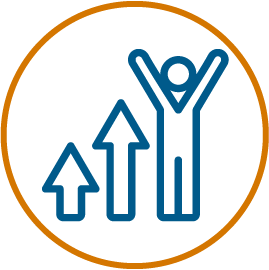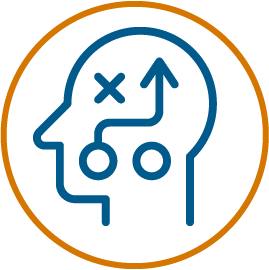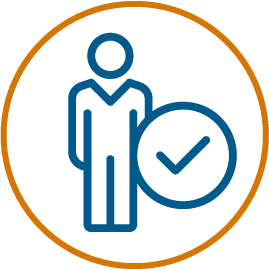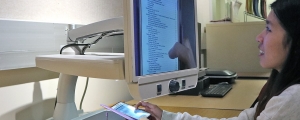Gain the skills and training to enhance the vocational opportunities, independent living, and educational development of people with vision loss.
Program Type
Graduate Certificate
Semester Start
Fall
Study Options
Online
Minimum Duration
1 Year
UMass Boston’s Vision Rehabilitation Therapy Certificate focuses on training professionals to enhance the vocational opportunities, independent living, and educational development of people with vision loss. It’s designed for teachers and other professionals who want to work with people with visual impairments and teach them daily living skills and strategies for safe, independent living. Explore cutting-edge learning technologies and gain practical hands-on experience through fieldwork. Apply these skills to assist people of all ages in different settings, including rehabilitation agencies, state vocational services for the blind, rehabilitation units of veterans hospitals, programs for elders with visual impairments, nonprofits, in private practice, and more. This program fulfills the eligibility requirements of the Association for Education and Rehabilitation of the Blind and Visually Impaired and prepares you to sit for the national certification exam from the Academy for Certification of Vision Rehabilitation & Education Professionals (ACVREP). You also have the option to continue on for an additional two semesters to earn a full Vision Studies MEd with a concentration in Vision Rehabilitation Therapy.
Tuition
- This program consists of three 3-credit courses and four 4-credit courses, or 25 credits.
- Those with a background in visual impairments may be eligible to complete the certification program in 19-25 credits. This includes:
- Teachers of those with visual impairments
- Those holding a bachelor’s degree or higher in Vision Studies
- Those holding a certification through ACVREP, such as COMS, CVRT, or CLVT
- Each course is $1,401.
- Total estimated tuition cost to complete this program is $7,000 - $11,675, depending on number of credits needed to complete the program.
- Other fees may apply. Request Info to connect with a program representative for further details.
This certificate can be completed in one year, but can take up to 2 years if you do not have vision background.
Deadline
- Applicants are accepted into the VRT certificate program once a year, for the fall semester only. Application deadline is June 1.
Application Checklist
- Online Application
- Transcripts — Official transcripts from all undergraduate and graduate institutions attended. A 3.0 undergraduate GPA is required.
- Three Letters of Recommendation — Use the forms provided by the Office of Graduate Admissions. Emphasis should be on academic and professional references.
- Test Scores: GRE, MAT, or MTEL — If you do not have a master’s degree, you will be required to take the Graduate Record Examination (GRE), Miller Analogies Test (MAT), or Massachusetts Test for Educator Licensure (MTEL). Please contact sgisd@umb.edu with questions regarding eligibility to waive scores.
- Statement of Interest and Intent (Required Writing Sample) — Submit a two-part essay:
- Explain your reasons for wishing to pursue graduate studies (approximately 300 words).
- Indicate your specific interest in Vision Rehabilitation Therapy and discuss the type of work you would like to do in this field (at least 1,200 words).
- This statement will be reviewed for both your overall message and your ability to write at the graduate level. Proofread your writing carefully; it is ranked according to its clarity, grammar, and syntax.
- Personal Interview with Faculty Member — When the Office of Graduate Admissions has notified us of your completed application, we will contact qualified candidates to arrange an interview (either in person or via teleconference).
- International Applicants Only — TOEFL Test Scores
- Braille I (VISN 603)
Become prepared to teach the reading and writing of Grade 2 Braille. You’ll learn how to write literary Braille using both a Perkins Brailler and a slate and stylus. You’ll explore topics including reading-readiness, tracking, tactile discrimination, and reading methods. - Visual Functioning (VISN 604)
Get a practical look at the functional impact of visual impairment through the use of simulated exercises. The course includes a series of medically related lectures by affiliated ophthalmologists covering various topics, including the structure of the eye, the assessment of normal and abnormal vision, optics, and the functional implications of common pathologies. You and your fellow students will discuss low-vision services and participate in ''hands-on'' training within a low-vision clinic. - Implications of Low Vision (VISN 605)
This course goes beyond the physical aspects of vision loss to look at functional and psychological aspects. You’ll review clinical procedures and the interpretation of clinical reports with an emphasis on conducting individualized functional vision assessments. You’ll apply previous study of optics to optical low-vision devices. In this course, you’ll get a practical, hands-on approach to learning through vision-simulation activities and the development of a functional vision-assessment kit. - Introduction to Vision Rehabilitation Therapy (VISN 630)
In this course, you’ll get hands-on instruction, independent learning, and laboratory practice in the methodologies and adaptive techniques utilized by the professional Vision Rehabilitation Therapist. You’ll examine the functional implications of vision loss on primary activities of daily living, with an emphasis in basic methodologies of Orientation and Mobility and Vision Rehabilitation Teaching. Exploration of life skills essential to independence will be addressed with consideration to student and adult populations. Weekly lecture content will be enhanced by functional lab activities designed to give you the opportunity to experience and critically assess the effectiveness of current methodology. - Methods of Vision Rehabilitation Therapy I (VISN 631)
This course provides you with hands-on instruction, independent learning, and laboratory practice in the methodologies and adaptive techniques utilized by the professional Vision Rehabilitation Therapist in the personal management, recreation, and leisure areas of Independent Living Skills. This course emphasizes the utilization of adaptive techniques and resources gathering and will address skills that are applicable for adults and older adults, as well as children and adolescents. Laboratory experience with blindfolds and low vision simulators will provide you with the opportunity to practice recommended techniques and adaptations that will facilitate the teaching of selected independent Living Skills to students, clients, and consumers who are blind or who have low vision. - Methods of Vision Rehabilitation Therapy II (VISN 632)
In this course, you’ll get hands-on instruction, independent learning, and laboratory practice in the methodologies and adaptive techniques utilized by the professional vision rehabilitation therapist in the Communications/Technology areas of Independent Living Skills. This course emphasizes the utilization of adaptive techniques and resources gathering and will address skills that are applicable for adults and older adults, as well as children and adolescents. Laboratory experiences with blindfolds and low vision simulators will provide you with the opportunity to practice recommended techniques and adaptations that will facilitate the teaching of selected Independent Living Skills to students, clients, and consumers who are blind or who have low vision. - Practicum in Vision Rehabilitation Therapy (VISN 639)
In this practicum, you gain experience in a full-time or part-time internship and must complete your hours in two semesters. As an intern, you are required to keep an ongoing diary of your experiences along with a capstone portfolio documenting clinical requirements set by ACVREP, totaling a minimum of 350 hours. This course and its associated advanced seminar series are for students who have completed coursework pre-practicum hours.
At the end of this nine-month program, you’ll be awarded a certificate in Vision Rehabilitation Therapy. The degree will demonstrate your expertise in the field on your résumé, as well as in interviews and workplace evaluations. Upon completion of the program, you will be prepared to sit for the national professional exam through the Academy for Certification of Vision Rehabilitation & Education Professionals. You also have the option to continue on for an additional two semesters to earn a full Vision Studies MEd with a concentration in Vision Rehabilitation Therapy.
Vision Rehabilitation Therapists work with a number of special populations among persons who are blind or visually impaired including persons who are deaf-blind, college students, persons over 55 years old, children in transition to adult services, persons who are multiply disabled, employed persons requiring “on the job training” or workplace management, and veterans.
Why UMass Boston Online?
Value
Among the lowest online tuition rates of an accredited, public research university.
Flexibility
Study full-time to finish fast, or part-time to suit your schedule. Live sessions scheduled with the working professional in mind.
Authenticity
The same courses taught by the same academic departments as on campus. No third-party providers.
Learn More






